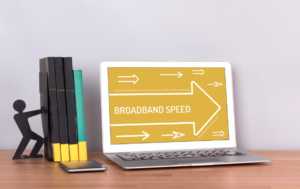 The most important factors to consider when comparing home broadband deals are cost and speed. Once you know the speed you need, you can shop around to find the best deal for your household. There are a number of ways that you can achieve a faster connection including switching providers, changing your router or even adjusting your home setup. Some obstacles to fast speeds can be harder to change, such as where you live. In this article we will look at what a good broadband speed means, how to find out if your connection is too slow and how to make the changes you need to get your home broadband up to speed.
The most important factors to consider when comparing home broadband deals are cost and speed. Once you know the speed you need, you can shop around to find the best deal for your household. There are a number of ways that you can achieve a faster connection including switching providers, changing your router or even adjusting your home setup. Some obstacles to fast speeds can be harder to change, such as where you live. In this article we will look at what a good broadband speed means, how to find out if your connection is too slow and how to make the changes you need to get your home broadband up to speed.
What is a good home broadband speed?
A good broadband speed for your household will be one that allows everyone using it to access the services they need without slowing down the overall connection. However, it is important to avoid paying for additional speed if you don’t need it.
The important number to look for when checking broadband speeds is the download speed. Most users are more likely to be downloading information through streaming or browsing than uploading files. According to Ofcom, the average UK home broadband download speed as of March 2023 was 69.4Mbps (Megabits per second). If streaming, you will need around 1.5Mbps of download speed per connected device, rising to around 3Mbps if streaming 4k content. With many electronic devices now requiring a broadband connection, you will likely find that your household will need around 10Mbps of download speed per person using the connection. UK broadband providers will usually offer download speeds starting from 10Mbps. Any connection faster than this is likely to be a fibre connection, which is more reliable than copper. These 'Superfast' deals with advertised speeds of 30-60Mbps, but may be difficult to find in more rural locations. 'Ultrafast' connections offering more than 300Mpbs are becoming more common, but will likely be limited to users living in certain urban areas.
Do not assume that lower speeds will be cheaper as some fibre broadband providers will offer cheaper deals than standard options, especially if it is part of a promotional deal.
What broadband speed do I need?
The speed your household needs will depend on how you use the internet. Low users looking to occasionally browse the internet will likely be able to get by on a standard 10Mbps package and standard users looking to steam content could be happy with 30Mbps, but serious gamers or streamers will require a high-speed connection of up to 100Mbps or more.
In the following table, we share what broadband speeds are required for various activities such as streaming TV shows and gaming, which should help to identify the broadband package that is best for your household. Remember that if you regularly use multiple devices at once, your speed will need to exceed the following examples.
| Streaming service | Required broadband speed per device | ||
| Netflix | SD | HD | UHD |
| 3Mbps | 5Mbps | 25Mbps | |
| YouTube | SD | HD | UHD |
| 2.5Mbps | 4Mbps | 15Mbps | |
| BBC iPlayer | SD | HD | UHD |
| 1.5Mbps | 2.8Mbps | 24Mbps | |
| Spotify (mobile) | 0.96Mbps | ||
| Spotify (desktop) | 0.16Mbps | ||
| Zoom (HD) | 2.5Mbps | ||
| Online gaming (e.g Xbox/Playstation) | 3Mbps | ||
| PlayStation Remote Play (online streaming) | 15Mbps | ||
How fast is my broadband?
The speed that your provider advertises is not necessarily the speed you will get. The best way to find out how fast your broadband is running is to do a free online speed test. Make sure you are connected to your Wi-Fi before you start the test. The results will tell you the upload and download speeds provided by your current connection.
If you are experiencing issues with your broadband such as buffering or unstable connections, you may decide that you need to find a new broadband deal with a faster speed or opt for a different type of broadband.
You can test your broadband speed for free. Try testing your connection multiple times at different points in the day and all around your home.
Do I need to change providers to speed up my internet?
You do not necessarily need to change your provider in order to increase your broadband speed. You might find that there are steps you can take before you begin to look for a new provider.
If you have a standard broadband deal, you may find that there are fibre options available with faster speeds at a similar price. Comparing broadband deals can help you make sure that you are not overpaying for the speed you are receiving.
You can compare a range of providers by using a comparison service such as Uswitch* to find out exactly what is available in your area.
Why is my internet so slow?
Your internet speed can be affected by a whole host of factors. It could be that you are paying for a standard broadband service, but doing more than sending emails and browsing the internet. This means that you can easily increase your speed by paying more for a better package or by switching providers. Your connection could also be slow because of how you are using your router or where you live. Before you decide to switch providers or put your house on the market, there are a couple of options to try.
Connect fewer devices
If you are overloading your broadband connection with multiple devices, your internet speed can suffer. Disconnecting devices that are downloading files or streaming music or video will increase the available speed for the rest of the network.
Rearrange your home
Where you put your devices in relation to your router could have a big impact on your internet speed. Thick walls and nearby electrical equipment can weaken the signal that comes from your router. You can counter this by placing your router as centrally in your home as possible and keeping it on a table or shelf, rather than on the floor.
Some factors that affect broadband speed are more difficult to adjust. For example, you may live far away from the local internet exchange or in an area with a high frequency of routers. You may find that fibre internet is unavailable where you live or that your area’s connectivity is affected by damaged cables. If you are not getting the speed your provider has promised, get in touch with them to find out why as you may be due compensation.
Check your wireless frequency
You may have the option to select a different wireless frequency which may improve your Wi-Fi connection. Many wireless routers can transmit at a number of different frequencies, the most common being 2.4 GHz and 5 GHz. A 2.4GHz frequency will travel farther, but at lower speeds, while a 5 GHz frequency provides faster speeds at a shorter range. Go into your wireless broadband settings and select the best frequency for your device and location.
How to find the best internet provider in your area
The best broadband provider for you will be the one that can offer you the right speed for a price you can afford. Comparing the deals available to your postcode will help narrow down the options available, as it is possible some providers will not be available in your area. You can use Ofcom's broadband checker to find the networks available in your area as well as the top estimated download and upload speeds.
Some locations in the UK will be able to access ‘ultrafast’ broadband speeds in excess of 100Mbps, but it is important to only pay extra for the speed you need.
If you pay for TV streaming services or other entertainment subscriptions, you may find that you can take advantage of broadband package deals. Some providers will group your TV, music and streaming with your broadband in one bill, which could work out cheaper. Make sure you are not paying for anything you do not use though, whether that is an extra streaming service or broadband speed.
Once you know the minimum broadband speed your household needs to use the internet, you can compare deals in that speed range and find the best price.
Can I switch broadband provider?
If your internet is too slow, you should think about switching to a new provider. Switching is usually quick and easy, especially if you are out of contract. Broadband customers whose contracts have gone beyond the minimum term can cancel and sign up with a new provider for free at any time. If you are still under contract, you can switch but you may need to pay an early exit fee.
One exception is if your provider is signed up to Ofcom’s ‘Broadband Speeds Code of Practice’. This allows you to still switch for free even if you are under contract if your provider is not delivering the speeds it promised when you signed up. Your provider will have a month from when you first complain to fix any issues in its network and get your broadband up to speed. If your provider cannot restore your connection to the minimum guaranteed speed that is listed in your contract, then it has to let you leave for free.
You can read more about switching your broadband in our article 'How to switch broadband provider'.




